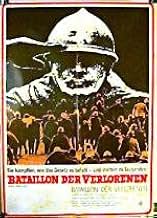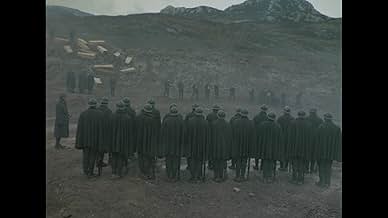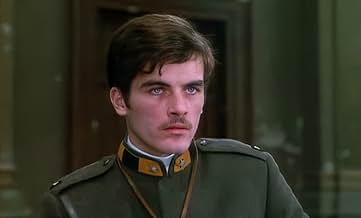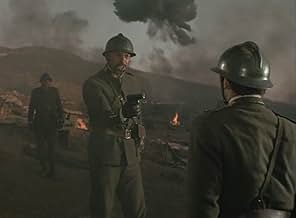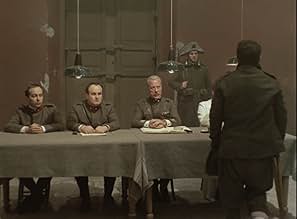AVALIAÇÃO DA IMDb
7,6/10
2,1 mil
SUA AVALIAÇÃO
Adicionar um enredo no seu idiomaOn the Italian/Austrian front during World War I, a disastrous Italian attack upon the Austrian positions leads to a mutiny among the Italian troops.On the Italian/Austrian front during World War I, a disastrous Italian attack upon the Austrian positions leads to a mutiny among the Italian troops.On the Italian/Austrian front during World War I, a disastrous Italian attack upon the Austrian positions leads to a mutiny among the Italian troops.
- Direção
- Roteiristas
- Artistas
- Prêmios
- 1 vitória no total
Franco Acampora
- Soldier
- (as Francesco Acampora)
Avaliações em destaque
You don't get that many films about World War One in comparison to World War Two, and you certainly don't get a lot of films about Italy's involvement in the War. The Alpine Front sounds just as a horrible and nasty as every other front. Better scenery I guess, but I'm sure that wasn't a priority to the countless youths blown up or machine-gunned in futile frontal attacks on machine gun posts.
It's in the Alps the film takes place, although I'm unsure of the exact year. The Italian Army has been ordered to abandon a mountain, but is then immediately ordered to retake it. The men are understandably upset about this, but General Leone won't accept anything but courage from his men, even if it means making an example of them over and over again. On the side of the men are officers Pier Paolo Capponi and Gian Marie Volonte, who repeatedly acts as buffers between the insane orders of the senior officers and the crushed spirits of the men.
There's not much background to many of the characters, and I think this was done on purpose. All the infantry are burned out by the time we meet them, and still they are thrown into battle over and over again, until even the Austrian defenders beg them to 'turn back - stop committing suicide'. The soldiers don't have a choice, however, as their own machine guns are trained on their backs. It's death in either direction and to quote from a British soldier involved in the Battle of High Wood "You had to go forward because at least you had a chance to stick a knife in the person shooting at you'.
There are grumbles of rebellion among the soldiers, and as the orders to attack despite little progress, who will even survive long enough to rebel?
This realistic, horrific film is kind of like an Italian Paths of Glory, only with a bit more action (if you can call it that when people are basically slaughtered). Both Volonte and Capponi are pretty intense as the officers who know how futile the situation is, and the whole film rolls along pretty quickly, just like the never-ending attacks ordered by the top brass. The only female character is Daria Nicoladi, who puts in a quick cameo as a nurse tending to a wounded man following a particularly costly attack, which also happens to be a turning point for a previously loyal soldier.
It's in the Alps the film takes place, although I'm unsure of the exact year. The Italian Army has been ordered to abandon a mountain, but is then immediately ordered to retake it. The men are understandably upset about this, but General Leone won't accept anything but courage from his men, even if it means making an example of them over and over again. On the side of the men are officers Pier Paolo Capponi and Gian Marie Volonte, who repeatedly acts as buffers between the insane orders of the senior officers and the crushed spirits of the men.
There's not much background to many of the characters, and I think this was done on purpose. All the infantry are burned out by the time we meet them, and still they are thrown into battle over and over again, until even the Austrian defenders beg them to 'turn back - stop committing suicide'. The soldiers don't have a choice, however, as their own machine guns are trained on their backs. It's death in either direction and to quote from a British soldier involved in the Battle of High Wood "You had to go forward because at least you had a chance to stick a knife in the person shooting at you'.
There are grumbles of rebellion among the soldiers, and as the orders to attack despite little progress, who will even survive long enough to rebel?
This realistic, horrific film is kind of like an Italian Paths of Glory, only with a bit more action (if you can call it that when people are basically slaughtered). Both Volonte and Capponi are pretty intense as the officers who know how futile the situation is, and the whole film rolls along pretty quickly, just like the never-ending attacks ordered by the top brass. The only female character is Daria Nicoladi, who puts in a quick cameo as a nurse tending to a wounded man following a particularly costly attack, which also happens to be a turning point for a previously loyal soldier.
Director Francesco Rosi has 'freely' adapted 'A Year on a High Plateau' by Emilio Lussu in which the author relates his experience of the horrors of trench warfare as an infantry officer.
There is no doubting the technical excellence of this film. The muted tones and sweeping camerawork of Pasqualino de Santis together with the ominous score of Piero Piccioni are riveting and Signor Rosi has beautifully choreographed the scenes of mass slaughter. The question is of course does the film engage our emotions? In my case I'm afraid not. There are too many scenes where the director is trying to make a point and is simply laying it on with a trowel.
The author himself, a highly principled and respected politician, was still alive when the film was released and was no doubt surprised at the fate of his character in the final scene! He thought that although some episodes were faithfully re-enacted the film's spirit was far removed from that of his original.
He is portrayed here as Sassu by Mark Frechette in one of two Italian films he made following his debut in Antonioni's 'Zabriskie Point'. His is a sincere and understated performance and it is a great pity that this actor was such a troubled soul who was to meet a bizarre end while serving a prison sentence for robbery!
The character of mad General Leone, based upon General Giacinto Ferrero, is played by veteran Alain Cuny. This role is a gift to any self-respecting character actor and his performance is utterly mesmerising. It comes as no surprise that Mr. Frechette is dubbed but it does seem strange that Monsieur Cuny is also dubbed considering he had been appearing in Italian films since the early 1950's. This does not however detract from his magnificently menacing portrayal. The 'socialist' element here and knowing Signor Rosi's work, there has to be one, is personified by the Ottolenghi of Gian Maria Volonte whose far-Left leanings have been well documented.
Upon its release this film met with a great deal of resistance from the military authorities. It has this in common of course with 'Paths of Glory' with which it has inevitably been compared. It must be said that although made on a smaller budget and in black-and-white, Stanley Kubrick's film packs a bigger punch as does the underrated 'Westfront' of G. W. Pabst.
Whatever its merits Francesco Rosi's film lacks the subtlety of those two films but still serves as a grim reminder that whichever way you look at it, war is hell.
There is no doubting the technical excellence of this film. The muted tones and sweeping camerawork of Pasqualino de Santis together with the ominous score of Piero Piccioni are riveting and Signor Rosi has beautifully choreographed the scenes of mass slaughter. The question is of course does the film engage our emotions? In my case I'm afraid not. There are too many scenes where the director is trying to make a point and is simply laying it on with a trowel.
The author himself, a highly principled and respected politician, was still alive when the film was released and was no doubt surprised at the fate of his character in the final scene! He thought that although some episodes were faithfully re-enacted the film's spirit was far removed from that of his original.
He is portrayed here as Sassu by Mark Frechette in one of two Italian films he made following his debut in Antonioni's 'Zabriskie Point'. His is a sincere and understated performance and it is a great pity that this actor was such a troubled soul who was to meet a bizarre end while serving a prison sentence for robbery!
The character of mad General Leone, based upon General Giacinto Ferrero, is played by veteran Alain Cuny. This role is a gift to any self-respecting character actor and his performance is utterly mesmerising. It comes as no surprise that Mr. Frechette is dubbed but it does seem strange that Monsieur Cuny is also dubbed considering he had been appearing in Italian films since the early 1950's. This does not however detract from his magnificently menacing portrayal. The 'socialist' element here and knowing Signor Rosi's work, there has to be one, is personified by the Ottolenghi of Gian Maria Volonte whose far-Left leanings have been well documented.
Upon its release this film met with a great deal of resistance from the military authorities. It has this in common of course with 'Paths of Glory' with which it has inevitably been compared. It must be said that although made on a smaller budget and in black-and-white, Stanley Kubrick's film packs a bigger punch as does the underrated 'Westfront' of G. W. Pabst.
Whatever its merits Francesco Rosi's film lacks the subtlety of those two films but still serves as a grim reminder that whichever way you look at it, war is hell.
This is really a lost masterpiece of an anti-war film. The total futility of the loss of life in wasted back and forth engagements to no advantage , just an horrendous mounting cost of carnage. Martinet officers strut their stuff, more interested in shooting their own men than any real advance. What was it in air those years ago that made men like this keep sending others into the meat grinders.
This is a very good war film that I can find on almost no list of the best war films. Gone and forgotten... because it was made in Italy??? I don't know.
More people should see it, up there with Kubrick's Paths of Glory.
This is a very good war film that I can find on almost no list of the best war films. Gone and forgotten... because it was made in Italy??? I don't know.
More people should see it, up there with Kubrick's Paths of Glory.
I am a bit of a war movie buff. I am also interested in military history, and W.W.I is one of my specialties, since I even got my PhD with a dissertation on W.W.I narratives. I also discussed Emilio Lussu's novel (Un anno sull'altipiano) Rosi's film is based on. Well, sometime when they make a film out of a novel you love, you may get disappointed. I wasn't. In many points Rosi wasn't faithful to the novel, but hey, that's what screenplays must be. The film is gorgeous nonetheless. What makes me rather sad is the horrible fact that there is no DVD version of this authentic masterpiece of world cinema, one of the most intelligent and impressive war films ever. This is a shame for Italy. Low-level Italian B-movies of the 70s have been made into DVDs, but this film hasn't. It's a real shame.
First World War. A more or less forgotten front: in the Italian Alps Italian and Austrian troops face each other. The Italian general Leone orders his men to storm the heavily defended Austrian lines without proper artillery support. They are butchered. Discontent finally leads to a mutiny.
This is a very dark movie that in a very moving way describes war in its utter absurdity. I consider it a great movie.
This is a very dark movie that in a very moving way describes war in its utter absurdity. I consider it a great movie.
Você sabia?
- CuriosidadesItalian censorship visa # 56677 delivered on 9 September 1970.
- ConexõesReferenced in Tenebrae: Interview with Dario Argento and Daria Nicolodi (1982)
Principais escolhas
Faça login para avaliar e ver a lista de recomendações personalizadas
- How long is Many Wars Ago?Fornecido pela Alexa
Detalhes
- Data de lançamento
- Países de origem
- Idioma
- Também conhecido como
- Many Wars Ago
- Locações de filme
- Empresas de produção
- Consulte mais créditos da empresa na IMDbPro
- Tempo de duração1 hora 41 minutos
- Mixagem de som
- Proporção
- 1.66 : 1
Contribua para esta página
Sugerir uma alteração ou adicionar conteúdo ausente

Principal brecha
By what name was A Vontade de um General (1970) officially released in India in English?
Responda
